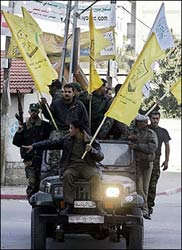
Palestinian security wave Fatah flags on their way to vote at a
polling station in Gaza City. (AFP)
Palestinian security forces started casting their votes on Saturday in the
Palestinian parliamentary elections, in an early ballot ahead of the scheduled
date of Jan. 25 for other Palestinian electorate.
Thousands of security personnel were expected to vote from Saturday to Monday
so that they can be freed from voting duty and better protect the voting process
next Wednesday when Palestinian civilians head to the polls.
The polling centers opened around 7:00 a.m. (0500 GMT) on Saturday and will
close at 7:00 p.m. on Monday.
The Palestinian Central Election Commission (CEC) declared that 58,705
Palestinian security personnel and police are expected to participate in the
voting.
A statement released by the CEC on Saturday said that the security personnel
and police in 17 constituencies will vote in 27 polling stations in the Gaza
Strip, 33 in both the West Bank and East Jerusalem.
Local and international monitors will be present at the polling stations
across the Palestinian territories, according to the statement.
Palestinian civilians will cast their ballots in the Gaza Strip, the West
Bank and East Jerusalem next Wednesday to choose a new 132-member legislature.
It will be the second parliamentary elections for Palestinians. The first
such elections were held in 1996.
The Jan. 25 Palestinian legislative elections will be heatedly contested by
President Mahmoud Abbas' ruling Fatah movement and the Islamic Resistance
Movement (Hamas).
Altogether over 400 candidates in 11 lists are slated to race in the
elections, including those of the Islamic Hamas, which is widely expected to do
well at the expense of Fatah in its first parliamentary bid.
Senior Hamas leaders called upon police and security forces on Friday to vote
for Hamas, denying earlier statements that said if Hamas wins in the elections,
most of the security forces will be fired.
The upcoming polls will proceed in accordance with a new Palestinian
electoral law passed last year.
Among the 132 legislators, 12 up from the previous 120 in the parliament, 66
members will be elected directly by constituents while the other 66 seats will
be allocated by the percentage of total votes parties or factions have managed
to garner across the Palestinian territories.



